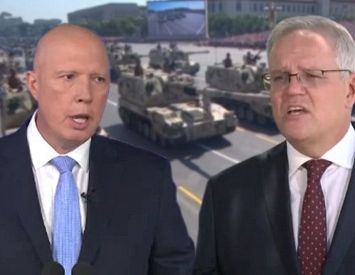In all the furore this week about former Prime Minister Scott Morrison’s secret ministries something very striking has stood out to astute political observers — the reactions of some sections of the media.
On Friday 12 August, the story of former Prime Minister Scott Morrison’s secret ministries dropped to promote the launch of a new political book penned by two News Corp journalists, Simon Benson and Geoff Chambers, Plagued: Australia’s Two Years of Hell. Respected by their peers, both journalists have had extensive careers as top political journalists in Australia’s mainstream media.
The story sent shockwaves through the Coalition party rooms, across the nation and around the world. The public was shocked and angry. Morrison’s Liberal colleagues were shocked and angry. The Nationals were ropable, Greens too, and it’s not often those two cohorts agree.
Former Home Affairs Minister, Karen Andrews, called on Morrison to resign and leave Parliament. Opposition Leader, Peter Dutton, tried to calm the angry mob by downplaying it and then eventually distancing himself from Morrison.
As the story unfolded throughout the week and further details were revealed, public anger grew, as did calls for Morrison to resign.
Former Liberal Leader John Hewson, ABC 7.30:
“I mean, I think if you had any shame about what you’d done, you would be seriously considering resignation, but, um, that is not his modus operandi.”
In a trainwreck, hour-long press conference on Wednesday, Morrison dug deeper into the hole he was in. He admitted he had disclosed the information about the secret ministries to the authors “contemporaneously” during the pandemic from March 2020 and throughout 2021.
With characteristic hubris, Morrison was the textbook definition of the acronym DARVO, "deny, attack, and reverse victim and offender".
Morrison’s explanation for his actions painted a picture of a messianic saviour of the nation but the timeline and secrecy indicated an unprecedented “sinister” grab for power. His excuses did not persuade a nation weary of his lies and no longer willing to tolerate his word-salads, selective amnesia, and non-answers.
The same day, Governor-General David Hurley issued a statement and declined to comment further.
By Thursday, former Prime Minister John Howard couldn’t comprehend let alone defend Morrison’s actions, and Greens Leader Adam Bandt announced he had asked Speaker Milton Dick to refer Morrison to the Privileges Committee.
Basically, after the story dropped the public reacted immediately.
Now, getting back to the behaviour of the Australian media.
Authors Benson and Chambers launched their book on 16 August, four days after their first pre-launch article. Both reputed to be top political journalists and presumably familiar with the tenets of journalistic integrity, it’s inexplicable why neither Benson nor Chambers recognised how big this story was or why they kept it secret for so long.
Their decision to publish this story, in a book, after the recent federal election has not been well-received by many Australians.
It begs the question: would Morrison have retained his safe seat had the people of Cook been privy to this information Benson and Chambers had kept under wraps until after the election? Would it have changed the composition of candidates standing against him? Would the outcome of the May 2022 Federal Election have changed as a result of this information?
I can’t imagine it would’ve attracted votes for the Liberals in May but we’ll never know. We know that Cook constituents, and Australians, were denied an informed vote.
The Australian public recognised immediately the unprecedented, yet likely legal, threat Morrison’s actions potentially posed to our democracy. And they also recognized that this important information should have been imparted to the general public as expeditiously as was humanly possible, not at the glacial speed of Benson and Chambers.
This episode has illustrated a genuine disconnect between the Australian public’s expectations of exalted political journalists and reality.
Quite a few other top political journalists in Australian mainstream media also failed to immediately realize the significance of the story and were slow out of the blocks, ABC began reporting the story on Monday 15th, 3 days after the story was published. On the ABC’s "flagship political program" Insiders last Sunday, host David Speers didn’t even mention it.
It took him six days to analyse the revelations. 2GB’s Ben Fordham couldn’t figure out what the big deal was calling it a “storm in a teacup”. Sky’s Andrew Bolt was onto it, on Tuesday, he said “he’s finished, quit Parliament now, just go”.
There’s been a bit of muted praise for Benson and Chambers from their industry peers but certainly not commensurate with a story of this significance. And on the flip side, condemnation from their peers for the timing of publication is rare, the antithesis of public attitudes.
It is rather odd that the authors of a story reverberating around the globe and being the impetus to calls for Parliamentary inquiries and reform aren’t being celebrated more loudly by their peers. Most Australians would know about this big story but wouldn’t be able to name the authors. Very little has been said or published about Benson and Chambers.
In 1972, the Watergate scandal broke and gathered pace as Bob Woodward and Carl Bernstein investigated and pieced together the now infamous tale with intrepid reporting and secret sources. Woodward and Bernstein worked for and published the stories in The Washington Post from June 1972 onwards as the story unfolded.
Subsequently, investigations revealed the truth and by August 1974 President Richard Nixon bowed to pressure and resigned. Woodward and Bernstein penned a book after the fact. To this day, Woodward and Bernstein are respected and honoured for their journalistic integrity and the integral role their journalism played in protecting American democracy.
Woodward and Bernstein became legends of journalism and democracy, household names around the world because they epitomised a free press holding power to account, the most fundamental ingredient of a functional democracy. It is true that democracy cannot exist without a free and impartial press but timing is critical too.
Recognising the ramifications of the issue at the heart of their story to its society and, critically, to its democracy and then acting in a timely manner is a core skill political journalists must possess in order to avoid accusations of incompetence or impropriety. Get your timing wrong and it won’t pass the pub test, as Benson and Chambers are probably realising.
If the gravity of the story they sat on for so long is dawning on Benson and Chambers and they now expect to be feted by the Australian public as some modern-day Woodward and Bernstein from down-under then they’re going to be bitterly disappointed.
The difference between Benson and Chambers and Woodward and Bernstein is that Woodward and Bernstein recognised the significance of their story, put democracy first and published their work in a timely manner, well before the Election.
You can follow Belinda Jones on Twitter @belindajones68.
Related Articles
- Morrison's devotion to Trump may be his undoing
- CARTOONS: ScoMinister had to bag a few more ministries
- Scott Morrison did it for Australia
- Scott Morrison — the man behind the swindle
- Dictator Morrison and the ‘you made me do it’ defence
 This work is licensed under a Creative Commons Attribution-NonCommercial-NoDerivs 3.0 Australia License
This work is licensed under a Creative Commons Attribution-NonCommercial-NoDerivs 3.0 Australia License
Support independent journalism Subscribe to IA.














